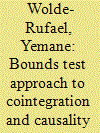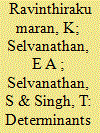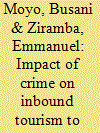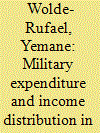| Srl | Item |
| 1 |
ID:
093470


|
|
|
|
|
| Publication |
2010.
|
| Summary/Abstract |
This paper attempts to examine the dynamic relationship between economic growth, nuclear energy consumption, labor and capital for India for the period 1969-2006. Applying the bounds test approach to cointegration developed by Pesaran et al. (2001)we find that there was a short- and a long-run relationship between nuclear energy consumption and economic growth. Using four long-run estimators we also found that nuclear energy consumption has a positive and a statistically significant impact on India's economic growth. Further, applying the Toda and Yamamoto (1995)approach to Granger causality and the variance decomposition approach developed by Pesaran and Shin (1998) we found a positive and a significant uni-directional causality running from nuclear energy consumption to economic growth without feedback. This implies that economic growth in India is dependent on nuclear energy consumption where a decrease in nuclear energy consumption may lead to a decrease in real income. For a fast growing energy-dependent economy this may have far-reaching implications for economic growth. India's economic growth can be frustrated if energy conservation measures are undertaken without due regard to the negative impact they have on economic growth.
|
|
|
|
|
|
|
|
|
|
|
|
|
|
|
|
| 2 |
ID:
141340


|
|
|
|
|
| Summary/Abstract |
Foreign direct investment (FDI) can play a significant role in achieving rapid economic growth in developing countries such as Sri Lanka. Even after the 30-year-long war that ended in 2009, the economy is still struggling to convince domestic and foreign investors that Sri Lanka is ‘ready for business’. In the light of this situation, identifying the factors that could influence FDI inflows into Sri Lanka is crucial to design policies aimed at attracting more FDI. This article empirically investigates the determinants of FDI inflows into Sri Lanka using annual data for the period 1978–2013 and applying the latest econometric techniques in time series analysis. As expected, market size, trade openness and infrastructure level have a positive impact, while wage and political instability have a negative impact on FDI. From a policy point of view, the results suggest that, to attract FDI inflows, Sri Lanka should develop and introduce policies that would improve the level of market size, trade openness, infrastructure and political stability but reduce the cost of labour.
|
|
|
|
|
|
|
|
|
|
|
|
|
|
|
|
| 3 |
ID:
117896


|
|
|
|
|
| Publication |
2013.
|
| Summary/Abstract |
The aim of this study was to investigate the impact of various types of crimes on tourist inflows to South Africa using an ARDL bounds test approach. We used monthly data for the period March 2003 to April 2011 and found that crime in the form of car hijackings, sexual crimes, murder and kidnapping have a long run and short run negative impact on tourist visits to South Africa. World income and lagged tourist visits were found to have a positive effect on tourist inflows suggesting that tourism is a luxury good and the experience that visitors have about the country is important. These results call for the government and players in the tourism sector, as well as other crime prevention units in the country, to come up with strategies for dealing with crime. Beefing up security systems and personnel and ensuring police visibility in all places, particularly at these tourist attractions, should be considered. Information should be provided to tourists, warning them about dangerous or crime-prone areas that should be avoided at all costs, as ensuring the safety and comfort of visitors is not only important for encouraging more visitations but also for ensuring sustainable tourism growth, employment creation and poverty alleviation.
|
|
|
|
|
|
|
|
|
|
|
|
|
|
|
|
| 4 |
ID:
144791


|
|
|
|
|
| Summary/Abstract |
This paper attempts to investigate the long-run and the causal relationship between military expenditure and income distribution in South Korea for the period 1965–2011. Applying the bounds test approach to cointegration, we found a long-run relationship between military expenditure and the Gini coefficient with military expenditure having a positive and a statistically significant impact on income inequality. A 1% rise in military expenditure increased the Gini coefficient by 0.38%. Application of the lag-augmented causality test also reveals a unidirectional causality running from military expenditure to income inequality. The evidence seems to suggest that devoting more resources to the military sector may further worsen income inequality in South Korea.
|
|
|
|
|
|
|
|
|
|
|
|
|
|
|
|